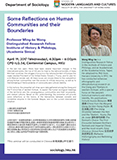
| News & Events |
| 19 April 2017 | |
Talk: Professor Ming-ke Wang April 19, 2017 (Wednesday), 4:30pm - 6:00pm |
|
In the last two years, there have been several important changes in the international arena: the rise of ISIS and its treat to the national borders of many Mid-East countries; the refugee crisis across the national borders of Europe; the newly-elected President of the United States, Donald J. Trump, and his plan for a US-Mexican border wall. All these issues are closely linked to the competition among human communities over the access to critical resources, as well as to the (re)making of the boundaries of community and cultural identity. In this lecture, the presenter will draw upon data gathered among the Qiang and the Yi minorities of western Sichuan, to explain the human ecological meanings of the territorial and the consanguineous communities and their boundaries, and related cultures. Based on this understanding, the presenter will provide some reflections on the history of the interactions between nomadic and residential empires in the Eurasian Steppe, and on the current international situation 人類社群及其邊界省思 王明珂 特聘研究員 近兩年來的一些國際局勢變化,如伊斯蘭國崛起及其對相關國家邊界之挑戰,如歐盟各國邊界因難民問題而緊張,美國川普總統積極加強邊境控管及築牆,這些都涉及人類資源競爭,社會結群,群體認同邊界以及相關的社會文化。在此演講中,講者由過去川西羌族,彝族村寨民族誌的例子,說明地緣與血緣性人類社群認同及相關文化的人類生態意義,藉此思考歐亞大陸游牧與定居帝國互動以及近代民族國家及其邊界形成之歷史,也藉此省思我們所面對的當今國際局勢。 *This seminar will be conducted in Chinese 本場演講以中文進行 Bio |
|
